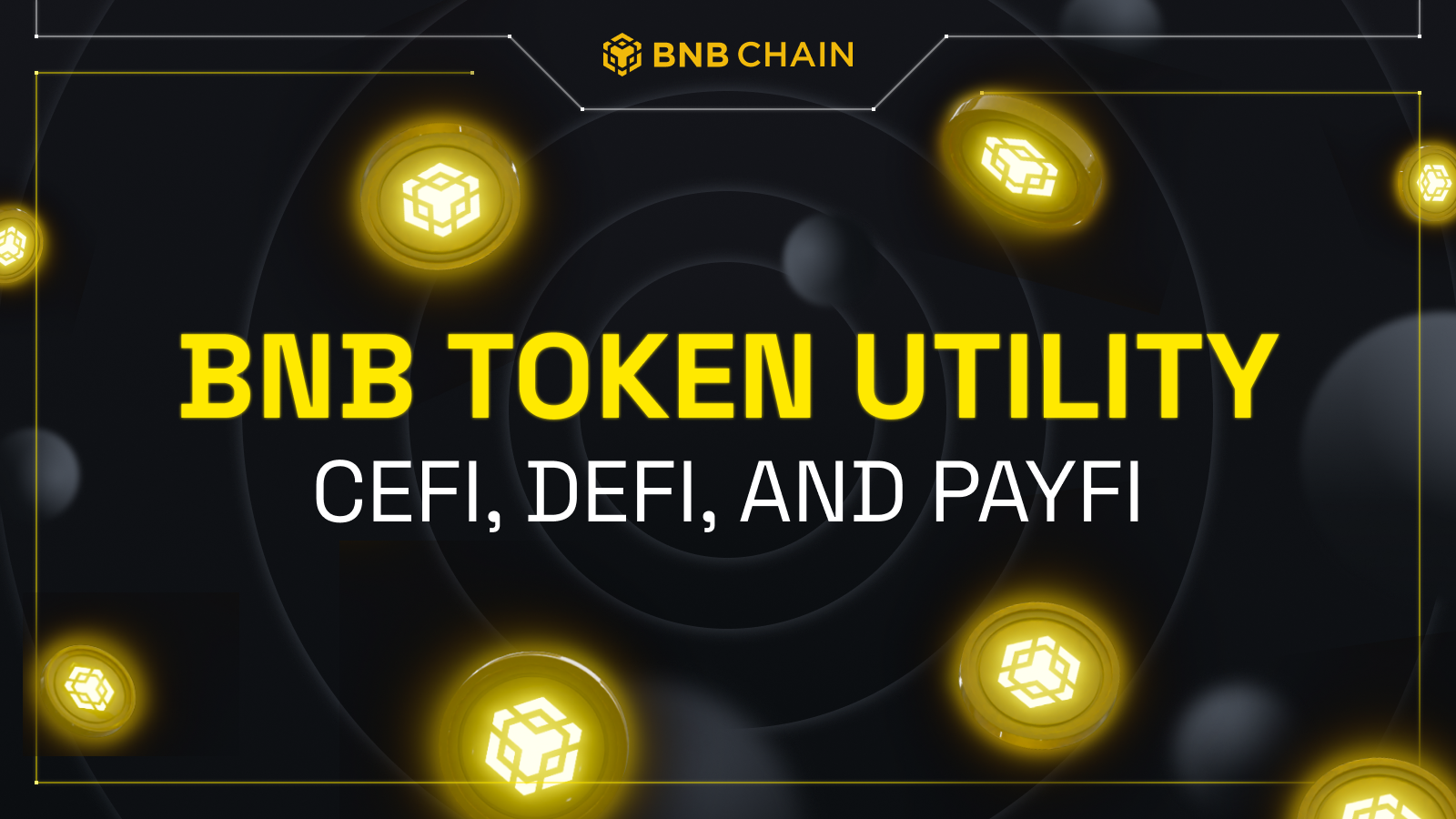Chains
BNB Beacon Chain
BNB ecosystem’s staking & governance layer
Developers
Solutions
Tokenization
Get Your Business Into Web3
Ecosystem
Community
BNB Token Use Cases - DeFi, CeFi, and PayFi

BNB, the native token of the BNB Chain ecosystem, has one of the most sophisticated tokenomics in the market. It is a critical utility and governance token that powers various decentralized applications and financial services.
BNB, or "Build and Build," was initially issued as an ERC-20 token on the Ethereum network. Its initial Coin Offering (ICO) was in July 2017. With the launch of BNB Chain in April 2019, BNB transitioned to its native chain.
Today, we’ll explore the full potential of the BNB token by breaking down its utilities across three key sectors:
- DeFi
- CeFi
- PayFi
DeFi Use Cases
BNB Chain has one of the most diverse DeFi ecosystems across both its layer-1 chain (BNB Smart Chain or BSC) and layer 2 (opBNB). BSC is ranked as the fourth-largest L1 protocol by market capitalization and TVL in the DeFi ecosystem.
Additionally, it has the second-highest number of DeFi protocols on its network of all chains. This includes an array of DeFi protocols, from lending and liquid staking to DEXs and restaking. As a result, projects building on BSC can seamlessly integrate with established DeFi protocols in the ecosystem.
The BNB token is your gateway to the BNB Chain DeFi ecosystem. Here are some of the most important use cases:
- Transaction Fees: BNB is required to pay transaction fees when interacting with the network.
- Exploring Dapps: BNB Chain hosts over 5,000 Dapps. BNB allows users to pay transaction fees and interact with these applications across various sectors, such as gaming, finance, and NFTs.
- Earning Through Dapps: Many Dapps on BNB Chain offer opportunities to earn rewards and yield. For instance, gaming Dapps may reward users in BNB or other tokens for completing in-game tasks and quests.
- Staking and Governance: Staking BNB helps maintain the network by validating transactions and enables holders to earn passive income. Additionally, staking BNB allows users to participate in governance decisions, giving them a say in the future direction of the network, such as fee structures and new features.
- Liquid Staking: Our ecosystem offers a variety of Liquid Staking Derivatives, including slisBNB and clisBNB. By participating, you can enjoy increased APY through various incentives. Additionally, you can further invest your LSTs into other DeFi protocols to maximize your returns.
- Restaking: Your Liquid Staking Tokens (LSTs) such as slisBNB can be restaked through restaking protocols to generate additional yield. Also, you'll receive a Liquid Restaked Token, which can be further invested into other DeFi protocols for even greater returns.
- Decentralized Exchange (DEX) Fees: BNB is essential for interacting with DEXes like PancakeSwap. BNB holders can use it to pay transaction fees when trading tokens on the DEX.
- Trust Wallet Launchpool: Lock your slisBNB on Trust Wallet Launchpool and receive exclusive reward tokens.
CeFi Use Cases
While DeFi focuses on decentralized services, BNB also plays a critical role in Centralized CeFi, particularly on Binance’s platform. Here are some key CeFi utilities:
- Trading Fee Discounts: BNB holders enjoy discounted trading fees on Binance, allowing for significant savings over time. Additionally, higher BNB balances qualify users for Binance's VIP program, offering even greater benefits.
- Exclusive Token Sales: BNB plays a crucial role in token sales on Binance Launchpad, where BNB holders can participate in early-stage blockchain projects and new token launches.
- Liquidity and Lending: Binance Liquid Swap enables BNB holders to pool their tokens and earn yield by providing liquidity to DeFi protocols. BNB holders can also lend their tokens through Binance Launchpool, earning rewards by supporting new projects.
- BNB Vault: BNB Vault is a yield aggregator that allows users to stake their BNB in various Binance products, including Simple Earn Flexible rewards and Launchpool, offering a streamlined way to earn rewards across the Binance ecosystem.
- Promotions: BNB, slisBNB and clisBNB holders are all eligible for Binance Launchpool, Megadrop, HODLer Airdrop.
PayFi Use Cases
PayFi, or Payment Finance, is where blockchain technology integrates into real-world payment solutions, offering real-time settlement for transactions. BNB is a key enabler of PayFi use cases, facilitating secure, fast, and cost-effective transactions.
- Shopping and Spending: Binance Pay allows users to shop online using BNB, offering seamless payments for goods and services globally. BNB can also be used with a growing number of merchants, including Shopify and other e-commerce platforms.
- Travel and E-commerce Payments: BNB can be used to book flights, hotels, and more through platforms like Travala.com. BNB is also accepted by various other travel and e-commerce platforms, making it a versatile token for real-world purchases.
- Entertainment and Services: Users can participate in games and activities hosted by Binance and earn BNB rewards. Also, freelancers and service providers can accept BNB payments for digital and real-world services.
- Financial Services: BNB enables a range of financial services, from loans to investments. Users can trade, take out loans, and pay for services with BNB, providing flexibility in managing their finances.
Conclusion
BNB is a versatile utility token that plays a crucial role in powering the BNB Chain ecosystem, facilitating both decentralized and centralized financial services. From interacting with Dapps and earning rewards to providing liquidity and accessing exclusive token sales, BNB stands as one of the most diverse and utilitarian coins in the crypto sector. Whether through DeFi, CeFi, or PayFi, BNB continues to build and fuel the future of decentralized finance.
Follow us to stay updated on everything BNB Chain
Website | Twitter | Telegram | Facebook | dApp Store | YouTube | Discord | LinkedIn | Build N' Build Forum